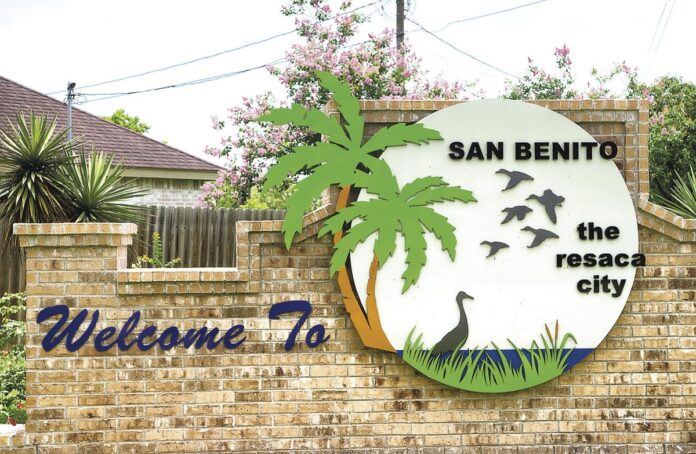SAN BENITO — Residents spoke out against raising water rates to fund street repairs, arguing they pay some of the Rio Grande Valley’s highest water bills.
Last night, commissioners met in closed session with City Attorney Ricardo Morado to discuss a proposal for a so-called street maintenance fee.
Commissioners took no action.
After the closed-door meeting, Commissioner Esteban Rodriguez, who proposed the street fee, said he planned to call a town hall meeting to discuss the proposal with residents.
“We want to see what route the citizens want to go,” Rodriguez said.
During the regular meeting’s public comment period, resident Rosie Olivarez warned she would launch a petition drive to try to stop commissioners from approving any water rate increase to fund street repairs.
Rodriguez proposed charging residents a monthly $2 fee projected to generate about $192,000 a year.
The proposed street maintenance fee could be added to utility customers’ monthly bills or it could be tacked onto the water rate, Rodriguez said in an earlier interview.
Rodriguez also proposed the option of increasing the city’s property tax rate of 72 cents per $100 valuation. However, he said he would have to discuss any proposed increase with commissioners.
Rodriguez said he realized the city’s residents pay some of the Valley’s highest water bills.
In 2004, the city began increasing its base water and sewer rates to help pay for utility improvements including a $17.7 million water plant, a $13 million sewer plant and a $1.6 million water tower.
The city’s base water rate stands at $20.59 for as much as 2,000 gallons while the sewer rate is $29.09 for up to 2,000 gallons.
Meanwhile, residents’ annual utility bills also include a garbage pick-up rate of $20.34.
But Rodriguez said he proposed the street fee in response to residents’ concerns bought up at a town hall meeting last month, when they described poor street conditions as one of the city’s biggest problems.
The proposed street fee would help fund more street repairs, Rodriguez said.
This year, the city’s new $12.7 million general fund budget has earmarked $1.8 million to fund the city’s street maintenance fund.
But only $450,089 of that amount is earmarked for street repairs, he said.
City Manager Manuel De La Rosa estimated it would cost about $7 million to repair about 80 streets.
“You have a lot of needs and very little resources,” De La Rosa told commissioners.
Mayor Ben Gomez suggested the city hire contractors to construct streets, arguing they would do a better job than city crews.
The Valley Morning Star questioned the legality behind the city’s move for “consultation with legal counsel on collecting a street maintenance fee” in executive session.
“All it was was a discussion with our city attorney for legal advice,” Rodriguez said after the closed-door meeting.
Catherine Robb, an Austin attorney who works with the Freedom of Information Foundation of Texas, said the Texas Government Code generally allows governmental entities to meet in executive session to discuss such matters as pending or contemplated litigation and settlements.
Robb also questioned the legality of meeting in executive session to discuss collecting a street fee.
“If there’s a specific question about the legal consequences, it might be OK,” Robb said in an interview. “If they’re discussing the legality of it, it might be OK. If they’re discussing broader issues — if it’s good public policy or how much money are we going to make — those wouldn’t fall under the specified section of the Texas Government Code.”
But Morado stated the commission was properly meeting in closed session.
“The item in question is specifically a consultation with legal counsel, not a general discussion of whether to implement a street maintenance fee. To the extent the commission seeks legal advice from the city attorney, it is not required to do so in open session,” Morado stated.
“It is correct that any discussion of whether to assess street maintenance fees, how to assess them and the amounts that can be assessed are all open session items of discussion; however, the commission may always meet with legal counsel in closed session to address questions or issues on which they seek legal advice,” Morado stated.





